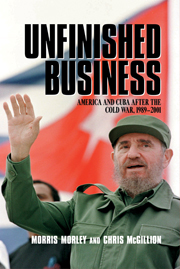Book contents
- Frontmatter
- Contents
- Acknowledgments
- Introduction
- 1 The Bush Administration and Cuba: From Cold War to Deep Freeze
- 2 Clinton and Cuba, January 1993 to February 1996: Closing the Options
- 3 Helms–Burton and the Triumph of Politics over Policy
- 4 Stirring the Waters: Clinton's Missed Opportunities
- Conclusion
- Postscript: Washington's Last Cold War
- Notes
- Index
Postscript: Washington's Last Cold War
Published online by Cambridge University Press: 28 July 2009
- Frontmatter
- Contents
- Acknowledgments
- Introduction
- 1 The Bush Administration and Cuba: From Cold War to Deep Freeze
- 2 Clinton and Cuba, January 1993 to February 1996: Closing the Options
- 3 Helms–Burton and the Triumph of Politics over Policy
- 4 Stirring the Waters: Clinton's Missed Opportunities
- Conclusion
- Postscript: Washington's Last Cold War
- Notes
- Index
Summary
The cavalry has arrived with respect to sanctions on Castro.
Rep. Lincoln Díaz-Balart on the Bush administrationTHE 2000 presidential election result came as a welcome relief to anti-Castro forces in the United States after the buffeting they had taken that year: first, in the court of public opinion over their handling of the Elián González affair, and second, in the Congress over the vote to exempt food and medicine sales from the embargo on Cuba. The return of a republican to the White House promised a reversal in their fortunes: at a minimum, George W. Bush could be expected to hold the line against the pressure from farm and business interests to ease sanctions and the debt he owed Cuban-American voters in Florida raised the possibility that he might consider harsh additional measures to bring about the downfall of the Castro regime. The new administration, said Cuban American National Foundation's (CANF) Dennis Hays, had a chance to “make a mark” on Cuba policy. To Ileana Ros-Lehtinen, that meant a halt to the “trickling, weakening of the U.S. embargo day-to-day during the Clinton administration.” Lincoln Díaz-Balart had made his position clear in an April 2000 memo to the Bush election campaign: Any move toward normalized relations must be predicated on political democratization and the release of political prisoners. The ever-apocalyptic chair of the Senate Foreign Relations Committee (SFRC) Jesse Helms went further.
- Type
- Chapter
- Information
- Unfinished BusinessAmerica and Cuba after the Cold War, 1989–2001, pp. 185 - 200Publisher: Cambridge University PressPrint publication year: 2002



